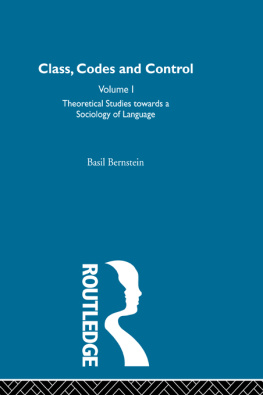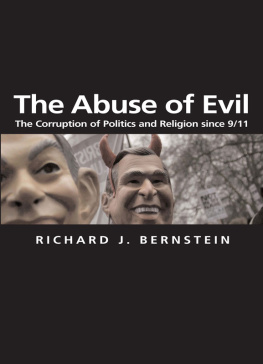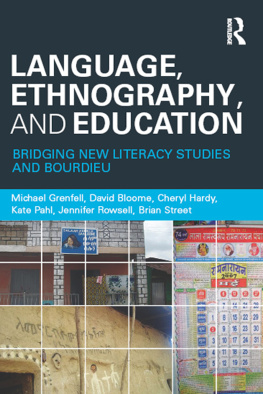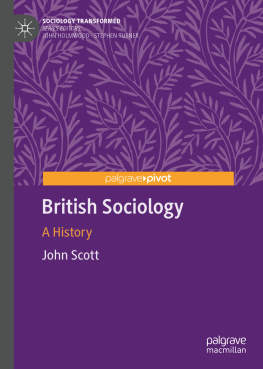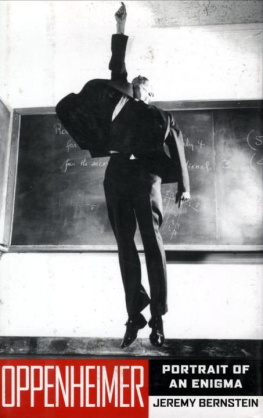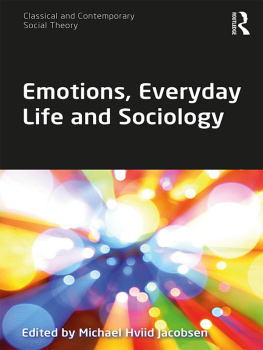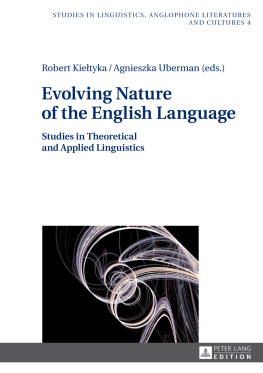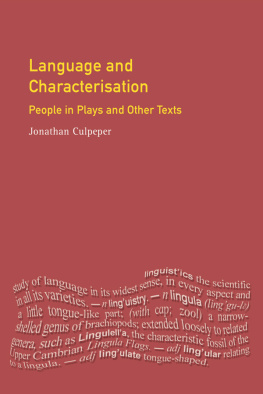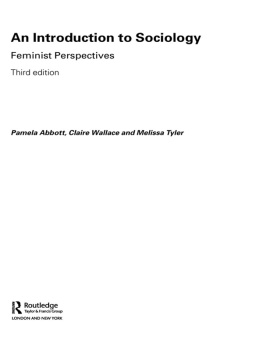Bernstein - Theoretical Studies Towards a Sociology of Language
Here you can read online Bernstein - Theoretical Studies Towards a Sociology of Language full text of the book (entire story) in english for free. Download pdf and epub, get meaning, cover and reviews about this ebook. City: London, year: 2003, publisher: Taylor & Francis (CAM);Routledge, genre: Romance novel. Description of the work, (preface) as well as reviews are available. Best literature library LitArk.com created for fans of good reading and offers a wide selection of genres:
Romance novel
Science fiction
Adventure
Detective
Science
History
Home and family
Prose
Art
Politics
Computer
Non-fiction
Religion
Business
Children
Humor
Choose a favorite category and find really read worthwhile books. Enjoy immersion in the world of imagination, feel the emotions of the characters or learn something new for yourself, make an fascinating discovery.
- Book:Theoretical Studies Towards a Sociology of Language
- Author:
- Publisher:Taylor & Francis (CAM);Routledge
- Genre:
- Year:2003
- City:London
- Rating:4 / 5
- Favourites:Add to favourites
- Your mark:
- 80
- 1
- 2
- 3
- 4
- 5
Theoretical Studies Towards a Sociology of Language: summary, description and annotation
We offer to read an annotation, description, summary or preface (depends on what the author of the book "Theoretical Studies Towards a Sociology of Language" wrote himself). If you haven't found the necessary information about the book — write in the comments, we will try to find it.
Theoretical Studies Towards a Sociology of Language — read online for free the complete book (whole text) full work
Below is the text of the book, divided by pages. System saving the place of the last page read, allows you to conveniently read the book "Theoretical Studies Towards a Sociology of Language" online for free, without having to search again every time where you left off. Put a bookmark, and you can go to the page where you finished reading at any time.
Font size:
Interval:
Bookmark:

CLASS, CODES AND CONTROL
CLASS, CODES AND CONTROL
VOLUME I
Class, Codes and Control
Theoretical Studies towards a Sociology of Language
Basil Bernstein
VOLUME II
Class, Codes and Control
Applied Studies towards a Sociology of Language
Basil Bernstein
VOLUME III
Class, Codes and Control
Towards a Theory of Educational Transmissions
Basil Bernstein
VOLUME IV
Class, Codes and Control
The Structuring of Pedagogic Discourse
Basil Bernstein
CLASS, CODES AND CONTROL
Basil Bernstein
Volume I
Theoretical Studies towards a Sociology of Language

LONDON AND NEW YORK
First published in 1971 by Routledge & Kegan Paul Ltd.
This edition published 2003 by Routledge 11 New Fetter Lane, London EC4P 4EE
Simultaneously published in the USA and Canada by Routledge 29 West 35th Street, New York, NY 10001
Routledge is an imprint of the Taylor & Francis Group
This edition published in the Taylor & Francis e-Library, 2005.
To purchase your own copy of this or any of Taylor & Francis or Routledges collection of thousands of eBooks please go to http://www.ebookstore.tandf.co.uk/.
Basil Bernstein 1971 2003 The Estate of Basil Bernstein
All rights reserved. No part of this book may be reprinted or reproduced or utilised in any form or by any electronic, mechanical, or other means, now known or hereafter invented, including photocopying and recording, or in any information storage or retrieval system, without permission in writing from the publishers.
British Library Cataloguing in Publication Data A catalogue record for this book is available from the British Library
Library of Congress Cataloging in Publication Data A catalog record for this book has been requested.
ISBN 0-203-01403-0 Master e-book ISBN
ISBN 0-415-302862 (Set)
ISBN 0-415-30287-0 (Print Edition)
Publishers Note
The publisher has gone to great lengths to ensure the quality of this reprint but points out that some imperfections in the original book may be apparent.
For Marion
My greatest debt is to the members of the Sociological Research Unit, Department of the Sociology of Education, University of London Institute of Education. I would also like to thank Miss Patricia Dyehouse, administrative secretary to the Department of the Sociology of Education, for her guidance in resolving the many difficulties in the preparation of this and the accompanying volume.
The papers in this book have been reprinted from the following journals and books. I am very grateful to the editors for their permission to reprint.
1 Some sociological determinants of perception, British Journal of Sociology IX, 15974, 1958.
2 A public language: some sociological implications of a linguistic form, British Journal of Sociology X, 31126, 1959.
3 Language and social class, British Journal of Sociology XI, 2716, 1960,
4 A review of The Lore and Language of Children by Opie, I. and Opie, P., British Journal of Sociology XI, 17881, 1960.
5 Linguistic codes, hesitation phenomena and intelligence, Language and Speech 5, 3146, 1962.
6 Social class, linguistic codes and grammatical elements, Language and Speech 5, 22140, 1962.
7 A socio-linguistic approach to social learning, Penguin Survey of the Social Sciences, ed. Gould, J., Penguin, 1965.
8 A socio-linguistic approach to socialization: with some reference to educability, in Directions in Socio-linguistics, eds. Hymes, D. and Gumperz, J.J., Holt, Rinehart & Winston, New York, 1971.
9 Social class, language and socialization, Current Trends in Linguistics, Vol. 12, Associate Editors: Abramson, A.S. et al., Mouton Press, 1971.
10 A critique of the concept of Compensatory Education, paper given at the Work Conference of the Teachers College, Columbia University, New York, 1969; appeared in Improving Opportunities for the Disadvantaged, ed. Passow, A.H., Teachers College Press, Columbia University. (In press.)
11 On the classification and framing of educational knowledge, in Knowledge and Control, ed. Young, M.F.D., Collier-Macmillan, 1971.
12 Addendum: A note on the coding of objects and modalities of social control, appendix to Class and pedagogies: visible and invisible, O.E.C.D. (C.E.R.I.) Paris, 1973.
13 Postscript: A brief account of the theory of codes, in Social Relationships and Language, Block 3 of the Educational Studies Second level course, Language and Learning, The Open University, 1973.
I should like to thank the DSIR, the Nuffield Foundation, the Department of Education and Science, the Ford Foundation and the Social Science Research Council for their grants to the Sociological Research Unit, which made the empirical research possible.
Foreword
Donald G.MacRae
Professor of Sociology, London School of Economics and Political Science
At the heart of all actual proceedings which we call scientific or scholarly lie unresolved inconsistencies and incompatibilities. Around, constricting yet supporting, all such activities is a structure of expectations about the nature of knowledge, of science, of particular disciplines, of what is culturally appropriate. And in its turn this structure is made possible by institutional elements embedded in it like the stressed metal bars in ferro-concrete beams. Very often, therefore, it is extremely difficult for novel work to get done in the world of science and learning, and even more difficult for it to be recognized. Novelty can always be condemned because attention can be drawn to its inherent incoherenciesincoherencies which, as I said, exist everywhere but which are unreflectingly accepted where nothing is unexpected and all is orthodox. In the increasingly institutionalized, centralized and costly world of the foundations, councils, learned societies and so on, working under the stresses of limited resources and a genuine responsibility, novelty is perturbing. Only the established can innovate: only non-innovators are established.
There are several consequences of this, There are today more, better-trained scientists and more science than ever before, but I do not think that at the ultimate level of creativity this investment of life and means has produced a great age of innovation comparable to the late seventeenth century, or the late nineteenth and early twentieth centuries. Our institutions and expectations are concerned with discovery, the finding of what is, in some sense, out there. By accredited navigational techniques more islets are found and accurately placed on the map. But that metaphor will not do what it does very well for discovery, at all well for scientific creativity. Creation, great or small, involves novelty of a different order, and it raises, of its nature what we would like to neglect, the inconsistencies and incompatibilities at the heart of the enterprise of knowledge.
Now this is not to condemn discovery or to regard all of it as easy far from that. Yet discovery has two modes which are genuine, but not very hard, at its core. The first of these is mimicry: the continuation or replication in another place or time of what has previously been done. This involves industry and technical competence and nothing more. The other mode, not quite unrelated, I privately call the mymecine. It is the exercise of an ant-like, scurrying energetic, part random, part purposeful industry which moves small particles of matter in great number. Both of these might meet the definition of genius as the infinite capacity to take pains. It is a very bad definition. Not all discovery is reducible to the mimetic or mymecine, but much is. There is always serendipity, the discovery and recognitionnot always easyof the unexpected. There is room for talent and art as well as for skill and strength. Nor should craftsmanship be despised.
Next pageFont size:
Interval:
Bookmark:
Similar books «Theoretical Studies Towards a Sociology of Language»
Look at similar books to Theoretical Studies Towards a Sociology of Language. We have selected literature similar in name and meaning in the hope of providing readers with more options to find new, interesting, not yet read works.
Discussion, reviews of the book Theoretical Studies Towards a Sociology of Language and just readers' own opinions. Leave your comments, write what you think about the work, its meaning or the main characters. Specify what exactly you liked and what you didn't like, and why you think so.

